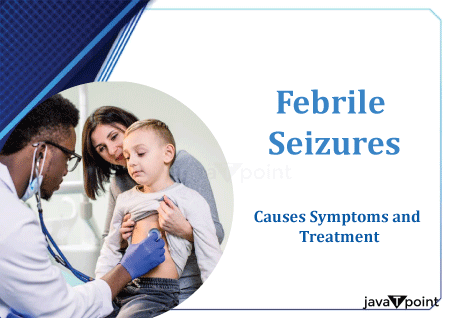Febrile SeizuresFebrile seizures are seizures caused by a fever in children. These convulsions are usually brief and painless. Most youngsters who have them will recover swiftly with no long-term consequences or difficulties. However, between 2.5% and 5% of children with complicated febrile episodes develop epilepsy. What exactly are febrile seizures?
A fever leads the child to have a febrile seizure. These seizures are age-related, occurring in newborns as young as 6 months and children as young as 5 years old. Febrile seizures are most common between the ages of 12 and 18 months. They are normally safe and have no long-term effects. Different types of Febrile SeizuresA febrile seizure can be classified into two categories. 1. Simple Febrile SeizureThe most frequent type of febrile seizure, accounting for approximately eight out of ten patients, is a simple febrile seizure. It is a fit that:
2. Complex Febrile SeizureComplex febrile seizures are rare, accounting for only two out of every ten instances. Complex febrile seizures include one or more of the following traits:
Which three signs and symptoms of febrile seizures are most typical?
ComplicationsFebrile seizures have been associated to an increased incidence of epilepsy, among other complications. Recent research findings may suggest a correlation between febrile seizures and sudden unexplained death in childhood (SUDC), presumably because of the link between febrile episodes and epilepsy. However, this link has not been confirmed, and SUDC is extremely rare, affecting approximately one in 100,000 children, or a 0.001% probability. Furthermore, one of the largest studies of its kind examined almost 1.5 million children with a history of febrile seizures and discovered no evidence of an elevated risk of death in later childhood or adulthood. Possible ReasonsWhat is the cause of febrile seizures?Febrile seizures are caused by fever. As a child's temperature increases on the first day of an illness, febrile seizures are more prevalent. A fever of at least 100.4 degrees Fahrenheit (38 degrees Celsius) is most likely. Children may experience a seizure before getting a fever in some situations. Frequent febrile seizures are caused by viral infections. However, fevers can be caused by any form of infection, including:
(Note: Some paediatric immunisations may cause fever, and if a kid suffers a febrile seizure after vaccination, the seizure is caused by the fever, not the vaccine.) Children who have one febrile seizure are more likely to have another. A youngster has a one in three chance of having a second febrile seizure. Approximately 10% of children who experience one febrile seizure will have three or more during their childhood. The risk is greatest in children who experience a febrile seizure before the age of one year. Healthcare and ManagementWhat is the treatment for febrile seizures?Simple febrile seizures are usually not treated. They usually only last a few minutes, and youngsters recover rapidly from them. During febrile diseases, parents can provide fever-reducing drugs such as acetaminophen (Tylenol) or ibuprofen (Motrin), but these may not prevent febrile seizures. Complex febrile seizures are more likely to necessitate medical attention. Rectal diazepam (Diastat) may be given for home use in children who have a history of protracted febrile seizures. This is normally utilised if the child has more than one seizure in 24 hours or if the seizure lasts longer than five minutes. To avoid febrile seizures, daily presrciption antiseizure medicines are rarely utilised. In most circumstances, this is not required. What can I do to alleviate this condition at home?People should not attempt to treat a first febrile seizure at home. A first-time febrile seizure requires rapid medical attention to ensure that it is not another type of seizure or the result of a severe infection such as meningitis or encephalitis (both of which can be fatal). If the kid has a history of febrile seizures, then the doctor can advise to treat them at home. Do the following things if it happens-
How can you avoid this symptom?Febrile seizures occur unexpectedly and are usually unpreventable. When should you contact a doctor?All first-time febrile seizures require immediate medical attention in a hospital emergency room or other type of emergency environment. If the kid has a history of febrile seizures, the paediatrician will be able to give the best advice on what can and should do to treat these seizures. They can also alert to any indicators that the child requires medical attention. In general, people should contact their child's paediatrician if any of the following situations occur:
When should you seek emergency medical attention?If a child has febrile seizures and are in any of the following scenarios, people should seek emergency medical attention:
Do Febrile Seizures have long-term consequences?Simple febrile seizures are usually not dangerous. There is little indication of long-term harm from uncomplicated febrile seizures, according to researchers. In addition, there is little to no evidence that uncomplicated febrile seizures enhance the likelihood of developing epilepsy. Complex febrile seizures are linked to an increased risk of subsequent seizure disorders. According to study, between 2.5% and 5% of children who have complicated febrile seizures will develop epilepsy. However, the majority of children who suffer complicated febrile seizures have no long-term consequences. A message from DoctorFebrile seizures can be terrifying, especially if the child has never had one. However, most febrile seizures are brief, and children recover rapidly with no long-term consequences. If people have any queries or concerns, please contact the child's paediatrician. They can provide advice and information to assist and appreciate the hazards.
Next TopicLumbar Disk Disease
|
 For Videos Join Our Youtube Channel: Join Now
For Videos Join Our Youtube Channel: Join Now
Feedback
- Send your Feedback to [email protected]
Help Others, Please Share









